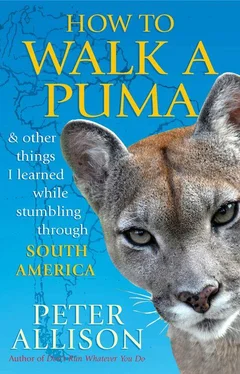‘Oh,’ I said, a little perplexed. ‘Constructing what?’
‘Hotels mainly.’ We tramped through the bog to the next nest box she was monitoring. Mud splashed high up her rubber boots, and straight over the low tops of mine and into my socks, a reminder that I was maybe not quite prepared for this place. ‘And shops for the tourists,’ she added after she was done with the next batch of chicks.
‘But the tourists come on boats and usually stay on board. What do they need hotels for?’ I asked, making a futile attempt to shake mud from my boot and spattering my other leg in the process.
There was a pause as Marcella inspected another nest. ‘Southern house wren,’ she said, and I thought she was being cryptic until I realised she was waiting for me to jot that down on a sheet next to the corresponding nest-box number.
‘The hotels are for the tourists the council hopes will come,’ Marcella carried on. ‘They need jobs for all the people now that the television factory has shut down.’
It seemed incomprehensibly odd to me that there had ever been a television-making industry in this far-flung place, an entire continent away from regular shipping routes since the Panama Canal had been built (which had happened well before television, I was pretty sure) and in a country not otherwise known for its electronics. But there it was, the television factory had supported Ushuaia from the 1960s to the late 1990s. I found myself imagining the industry as a cover for the sort of villain who appears in James Bond films; perhaps one of the nearby mountains had concealed their underground lairs at the end of the world. Then again, those villains liked their comforts. This place was just too cold.
Incredibly, despite the bitter winds sending a chill through me whenever I ventured outside, this was summer. And not just summer, but high summer. Yet snow still topped the mountains and no sensible person would contemplate going outside without many layers of clothes. Even though the temperature was often generous enough to rise above freezing, the ceaseless wind negated that gift, terrorising those who hadn’t fattened up on the beef and king crab on sale in the local restaurants (one of which, not surprisingly, proclaimed itself to be ‘The restaurant at the end of the world!’).
•
Although Ushuaia has a pleasant local national park and a much-touted glacier (even if it turned out to be little bigger than an ice cube), and in spite of the fact that I’d got to see several species of bird new to me, and watched a single and illegal boat flare (illegal because of the wind— any fireworks could set the town alight) usher in a new year and decade, it just wasn’t life-changing in the way I’d hoped my first stop in Patagonia would be. Unfortunately, just as I came to this realisation I found out there were no available seats on buses out of the place for over a week, so the only way I could depart was by plane once again.
The flight out of Ushuaia was as beautiful and exciting as the one in, mountains clutching at the plane’s wingtips as it climbed, climbed, climbed above the snow, before dipping almost immediately.
I was on my way to the small town of El Calafate, still in Patagonia but further north, and not as obsessed with its location as Ushuaia is. There, I hoped, I would find the wildness, find everything that made Patagonia famous. Luckily I had no idea of the disaster I was setting myself up for.
The Empanada Disaster

Riding the bus from the airport into El Calafate, I felt a tingle of excitement as I took in the scenery, which was bare but not in that manufactured, blasted way humans so often create. Instead its barrenness was that of a landscape no machine could modify. After the streets of Ushuaia, with all those trinkets that were as authentic and tacky as a porn star’s moans, this felt special. It felt wild.
My attention drawn by a sudden movement on the plain I recognised a guanaco, a wild relative of the llama. Beaming as I do whenever I see an animal for the first time (and often on subsequent viewings too), I turned to my fellow passengers to see if anyone else shared my delight, but saw nothing but bland disinterest on their faces. When the next animal I spotted turned out to be a rhea, a large flightless bird that was also new to me, I kept my face pressed to the glass and enjoyed the sight by myself, not losing my grin even when we hit a bump in the road and my head bounced away from and then violently back into the window.
The landscape changed several times on our way into town, each change thrillingly different from the previous scene—the plain yielding to clefted red rocks, then to rounded hills, then to views of distant forested mountains. This was the place, I was sure. This was the place I would find the real wild Patagonia.
The central part of El Calafate turned out to be touristy, with buildings made of timber so rough-hewn it must have been aimed at creating a sort of rustic charm, but triple varnished so it gleamed like no wood should. The price of food was so high it was also clearly aimed at tourists. Still, you only had to venture down a side street to find the places where the locals ate, identifiable as such because they were crowded and because no one inside them was wearing branded outdoor gear.
The best food in most places is rarely found in tourist joints because restaurateurs in those places don’t have to worry about tourists coming back, only about getting them in the door. But if you cater to locals, your food needs to be good. And cheap. If the customers of a café or restaurant all went quiet when I entered, like the moment in a Western before a gunfight erupts, I knew I must be in the right place. Even if baleful glares and unresponsive service staff showed I wasn’t particularly welcome, the food was bound to be worth it.
Using this theory, I found an empanada restaurant which literally sold only empanadas, a sort of pie stuffed with fish, meat or vegetables. No pizzas, no burgers, no appeal-to-the-tourists llama steaks, just empanadas. If you wanted a soft drink, you had to cross the road to the general store. I ordered six of the little pasties, and ate them for lunch as I made my way to a lagoon I’d seen on a map of the region, cutting through back streets instead of taking the regular paved route. It was a mistake, but an enlightening one.
Dust puffed from my heels, swirling up and away on the violent wind which also caught the omnipresent plastic bags and pinned them to bushes and trees. Empty bottles swept by, glass ones tinkling, plastic ones drumming, while turkey vultures overhead simultaneously battled the gale and tried to determine what in the scene below them was dead and what was garbage. The amount of litter was staggering, and made the neat streets I had just come from seem like deliberate fakery by the town fathers, like an apparently pristine apple that is rotten from the skin back.
Naturally, garbage had no respect for the fence that marked the perimeter of the small reserve where the lagoon was located, so scattered in the water among the ducks, coots, flamingos and geese were pink, blue and green shopping bags. Though I was excited to see birds in the lagoon I had never seen before, I worried for them, feeding amid such a lethal buffet.
As I walked around to the far side of the lagoon I felt my stomach flop, then flip, then twist, then gurgle and splutter. I clutched it in sudden pain, all the while trying to focus on whether it really was a Chiloe wigeon I was looking at.
As my hands started to shake I told myself that it would pass, sure that as with so many other lurgies I’d had in both Africa and South America this would be a small thing, and that the best course of action was to ignore it and carry on. So carry on I did, wandering around the reserve watching birds, saying hello to some horses that lived there, patting the stray dogs who followed me everywhere as if I were some sort of canine messiah (which would have been quite flattering if I’d had no sense of smell and couldn’t detect their malodour). Finally, I headed back to the hostel along litter-laden streets, battling against the wind. Sinister gurgles were emanating from my mid-section by the time I reached the hostel, but I hoped they might diminish if I lay down for a while.
Читать дальше













